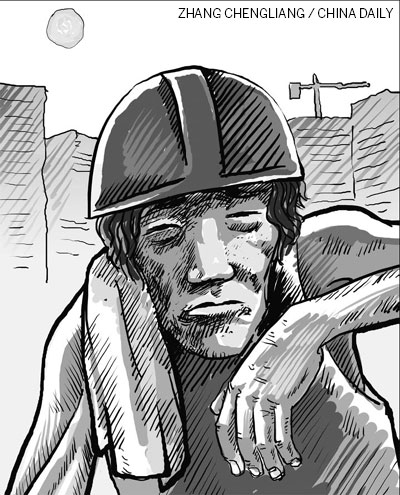Comment
Hot days subsidy is impractical solution for our sweaty workers
By Jenelle Whittaker (China Daily)
Updated: 2010-07-13 10:08
 |
Large Medium Small |

Beijingers had a reason to complain about the heat last Monday; at 5.00 pm the thermometer hit 40.6 degrees Celsius, the hottest temperature for this time of the year since 1951, according to the National Meteorological Center.
The following day, Beijing government doubled the high temperature subsidy. Workers will receive 120 yuan each month for working outside in temperatures higher than 33 degrees Celsius and indoor workers will receive a minimum subsidy of 90 yuan, up from 45 yuan, according to the new Municipal Human Resources and Social Security Bureau regulation.
The increased subsidy looks good on paper but it is hard to implement and may not benefit the workers who are most affected by the heat.
News that employers are obliged to pay staff compensation for working in the heat is not new. In 2007, the Beijing Human Resource and Social Security Bureau issued a notice for employers to reduce working hours and intensity during the summer. The bureau also said there should be a monthly subsidy of more than 60 yuan if the working temperature is above 33 degrees Celsius.
Yet when asked by METRO, most construction workers had no idea about the compensation.
"If we do not know about the subsidy, how could we complain about not getting it," one construction worker was quoted as saying.
If this regulation is to be effective and benefit workers, an education campaign about the subsidy needs to be undertaken to inform them of their rights. According to the bureau, if workers are not paid the subsidy, they can apply to their local human resources and social security department for arbitration.
However, the main problem is the subsidy is merely a regulation and not an enforceable law. Whether workers actually receive a subsidy depends completely on their employer.
High temperature subsidies exist on paper across China and vary in the amount of compensation workers will receive.
Under Guangdong provincial regulations issued in 2007, all employees are entitled to a subsidy payment each month from June to October regardless of the actual temperature during those months and whether the company can provide an air-conditioned work environment. Employees who work outside in high temperatures receive a monthly subsidy of 150 yuan and employees who do not work in high temperature receive 100 yuan.
However, according to a senior official in Guangzhou, 80 percent of companies do not comply.
As a result in July last year, the Shenzhen municipal government instructed local labor bureaus to audit companies for compliance.
Auditing companies for compliance and conducting an education campaign will only work for large companies who don't want to risk harming their international reputation and losing good workers. It will not be successful across the board.
How can migrant workers in Beijing, who often don't receive their promised wage and have no one to complain to, toy with the idea that they are entitled to special allowances for working in extreme conditions?
On Monday night a few hours after the temperature peaked at 40.6 degrees Celsius, I received a text message from my boss that read; "tomorrow is 39 degrees, to avoid heat stroke, everyone will work from home, please stay healthy."
I don't work outside and I don't have a manual job yet I felt immensely happy about this news. Instead of riding my bike to sit in a stuffy room with an air-conditioner that rarely gets used, I could work from home in comfortable clothes and control the temperature in the apartment.
Others, more deserving of a break from working in the intense sunshine, were not so lucky. Construction work, street cleaning and gardening continued. The effects of excessive heat include lack of concentration, dizziness, headaches, nausea and increased stress levels, all of which could be dangerous on a construction site and lead to increased accidents.
Guidelines and regulations protecting workers laboring in extreme heat are not effective and do not benefit workers who are most at risk of heat stroke. A law needs to be passed mandating employers to pay workers their high temperature subsidy. And then it needs to be strictly enforced, not simply ignored.
China Daily